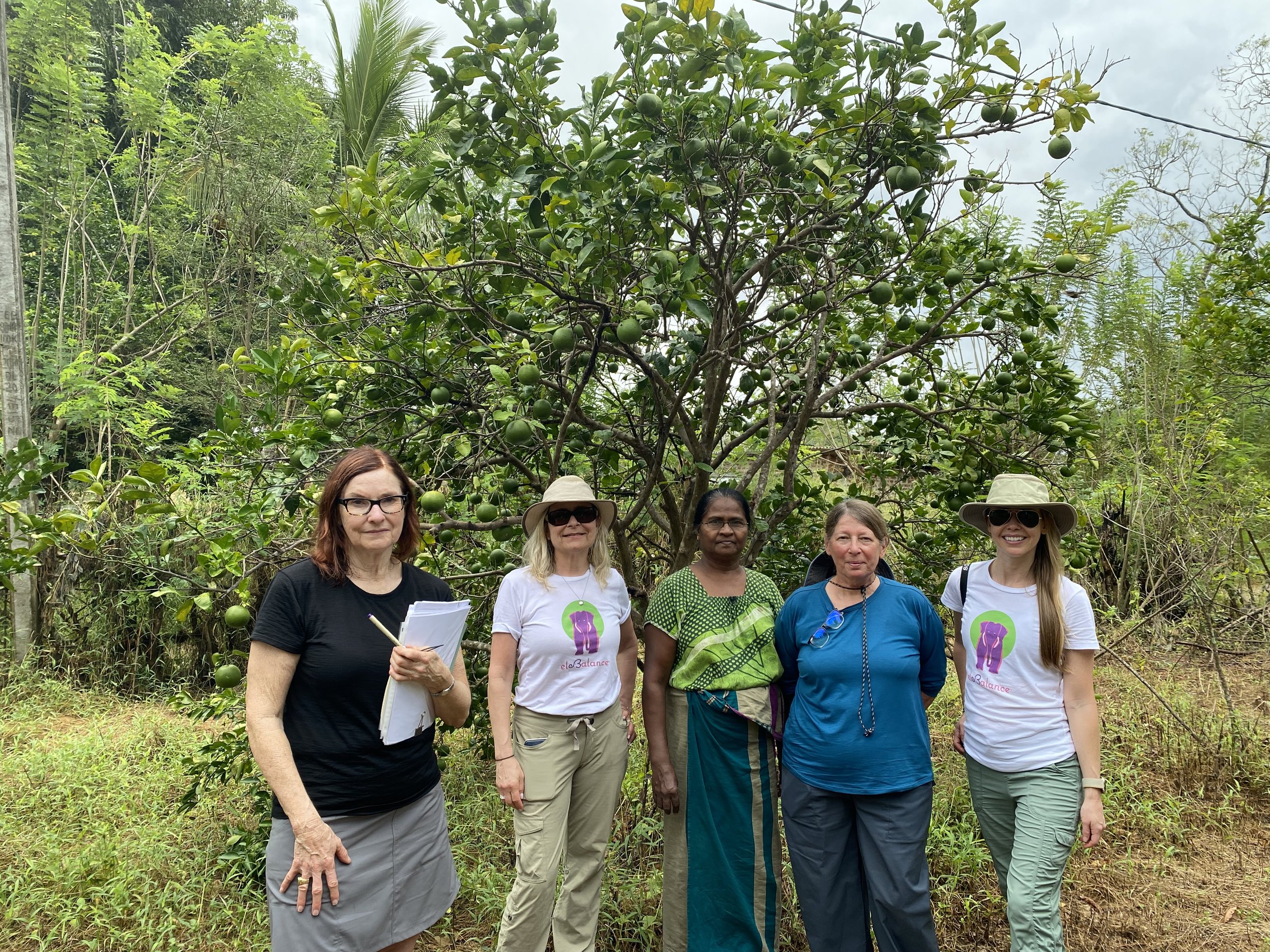EleBalance team travels to Sri Lanka!




In March of 2024, our team of EleBalance founders - Kim, Soraya, Chris, and Amber - made a trip around the globe to Sri Lanka for the first time together as a team. Five years earlier, upon learning about The Sri Lanka Wildlife Conservation Societies’ (SLWCS) projects to help mitigate human-elephant conflict, Kim and Soraya traveled to Sri Lanka with Natural Habitat Adventures. They met with Ravi Corea, founder of SLWCS and the SLWCS team for the first time. During this time, they visited villages, met with farmers and explored Wasaguama park. Kim and Soraya were particularly impressed with a program SLWCS created called Project Orange Elephant (POE). The main initiative of POE is planting orange trees around farms in rural Sri Lanka to divert elephants. Research conducted by scientists in the country led to the discovery that asian elephants have a natural aversion to citrus. The orange trees protect crops and rice stored in homes from elephant incursions and supply a supplemental income to farmers. Sri Lanka has a large population of free roaming asian elephants, and life threatening encounters between humans and elephants occur. Because of their backgrounds working with farmers and supplying agriculture based products to the personal care industry, Kim and Soraya saw an opportunity to use their past experience to enhance POE.
Elephant family sighting in Wasgamuwa National Park.
After a five hour journey from Colombo through the jungle, where we spotted monkeys and had our first elephant sighting, our team arrived in Wasgamuwa. The SLWCS headquarters is located in Wasgamuwa, near the locations of the POE farmers, and all of the farmers EleBalance is working with. Since 2020, the EleBalance team had regular meetings over Zoom calls with Ravi, Chinthaka, and Chandima from SLWCS. At the time, we had identified about 100 farmers to work with, and created monthly data reports to help understand the challenges and validate their findings that oranges deter elephants. The SLWCS team went to each farm location to record data including the number of orange trees planted at each farm, the source of irrigation, any problems like insect infestation or poor soil conditions, the number of elephant sightings, and the number of oranges each tree yielded. Before working with EleBalance, SLWCS was not collecting this kind of data, and it continues to be vital to the work we do. Realizing 100 farmers was simply too many for EleBalance to exclusively work with, a goal of our trip to Sri Lanka was to identify key farmers to work with. We were seeking partners that are motivated to maintain their orange trees, and who see the value the trees bring in both mitigating elephant encounters and providing the farmers with a sustainable source of income.
Members of SLWCS and EleBalance team with our partner farmer and his family.
Our team spent four days traveling to approximately 20 different farms, meeting truly amazing farmers and their families along the way. Physically being in Wasgamuwa gave us insight into what’s happening on the ground, and how the orange trees are positively impacting farmer’s lives. Sadly, several days before our arrival, Wasgamuwa experienced its first elephant death due to human encounters in many years. Because of the implementation of POE, this area in Sri Lanka has had a significant decrease in elephant as well as human deaths. The orange trees have been doing what the project intended for them to do - keeping elephants at a distance from farmer’s homes and keeping elephants and humans safe.
The ultimate goal of the EleBalance project is to work with farmers to improve their farms to become self-sustaining and not have to rely on donations. During our trip, we identified eight different farmers in five different villages to continue closely working with. These farmers see the value in planting and maintaining orange trees, and some have become a leader in their villages. Moving forward, we are excited to work with these farmers to help improve and expand their orange tree crops. The first step is providing them with the equipment they need to operate, items like grass cutters or water tanks. Things that seem small to many of us, but make a difference to the hardworking farmers in Wasgamuwa. Until our farmers are able to become self-sustaining, EleBalance is still seeking donations to provide them with the tools they need to succeed. Our hope is that other farmers will see the benefits of caring for their orange trees, both for safety and a sustainable source of income, and will also want to work with EleBalance. Doing so will continue to protect elephants and humans.
The EleBalance team from left to right: Chris Fouts, Kim Swilpa, Soraya Rohde, Amber Kazansky.



